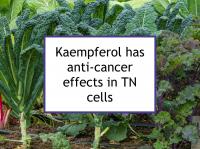Kaempferol, a flavonol found in a variety of foods, has been reported to inhibit the growth and proliferation of both hormone receptor positive (ER+/PR+) and triple negative (ER-/PR-/HER2-) cells. Several epidemiological studies have also found that women with diets high in flavonols (primarily kaempferol, quercetin and fisetin) have reduced breast cancer risk.
Now a new study has reported how kaempferol induces anti-cancer effects in triple negative breast cancer cells.
Best food sources of kaempferol
The following recommended foods are excellent or good sources of kaempferol:
Note that while green tea is a good source of kaempferol, it might reduce the effectiveness of doxorubicin (doxorubicin) and other anthracycline chemotherapy through its caffeine content.
Latest research reports kaempferol effects in TN cells
The study referenced above was designed to investigate how kaempferol induces cell cycle arrest and affects genes involved in treatment resistance in triple negative cells from both Caucasian (MDA-MB-231) and African-American (MDA-MB-468) women. Triple negative breast cancer affects African-American women more aggressively compared to other ethnic groups.
Immunotherapies such as PD-L1 inhibitors have been shown to be effective in treating triple negative breast cancer, but treatment resistance often develops eventually. To conduct the study, the authors analyzed how kaempferol modulated the levels of cyclin-dependent kinases (CDKs) involved in the initiation of cell cycle arrest and their association with the increased expression of PD-L1 and genes involved in treatment resistance.
Kaempferol was shown to cause cell death at various concentrations in both cell lines. Kaempferol induced cell cycle arrest at the S phase, downregulated the expression of CDK1 and CDK7, and induced apoptosis (programmed cell death). In addition, kaempferol downregulated the expression of PD-L1 in both cell types. Kaempferol also downregulated NFκ-B1 expression, which is involved in inducing resistance in triple negative cells. The authors conclude that kaempferol may have the potential to modulate PD-L1 expression and the development of resistance toward conventional triple negative immunotherapies.
Please see our article on triple negative diet and the kaempferol tag for more information.
